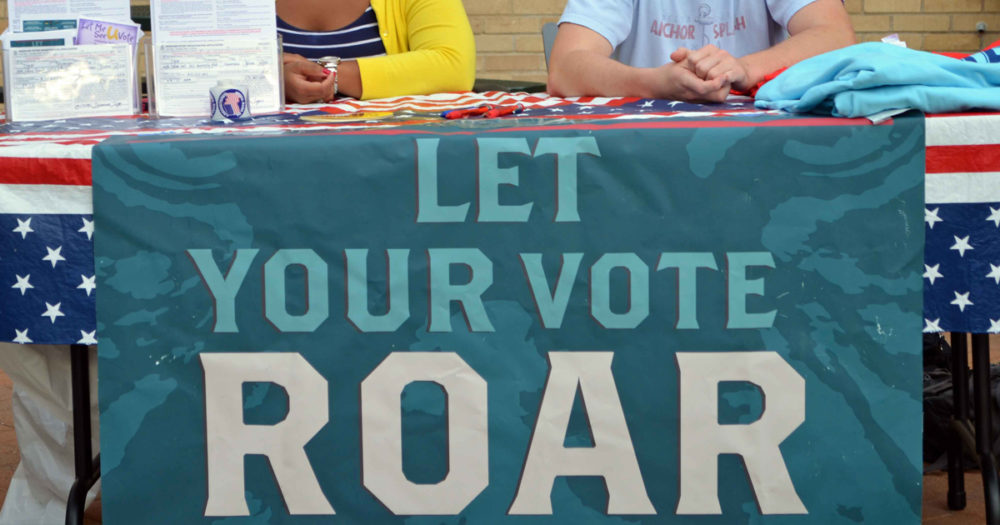As the 2018 general midterm election approaches, college student voting rights are under attack. Students are being specifically targeted for voter suppression in a number of states by excluding student identification as an acceptable form of voter identification, tightening up residency requirements, and selectively spreading misinformation. Fortunately, in several states, campus-wide and student-led movements are organizing and mobilizing college voters in a recognition of the historic role that students have played in the civil and voting rights movements in the United States and abroad.
New hurdles for students
Many states still do not allow absentee voting, often preventing students from outside of their birth states from casting a ballot. More specifically, and more frequently since the Supreme Court overturned sections of the 1965 Voting Rights Act in 2013, dozens of states have implemented voter identification requirements, some of which either exclude student identification as a valid form of ID, or require proof of residency with forms (electric bills, etc.) that students living on campus are less likely to have. A University of Michigan study has demonstrated the recent decline of drivers’ license ownership among college students, a form of identification frequently used in states with strict voter ID laws.
Perhaps most notoriously, the state of New Hampshire recently legislated the equivalent of a poll tax on out-of-state students, a residency requirement that includes registering one’s vehicle with the state and getting a New Hampshire driver’s license, which can cost several hundred dollars. New Hampshire students have one chance , this November, to overturn the law: because it does not go into effect until 2019, they have an opportunity to mobilize and change the leadership in the legislature, a legislature that intentionally targeted them.
Direct, intentional targeting of students to suppress their votes in not solely the province of legislatures. For example, in 2016, campuses in Maine were targeted with flyers providing false information about voting and registration requirements, and past elections have seen campuses targeted by organizations that fraudulently register students without completing their registration.
Nevertheless, students organizing to protect voting rights in other states have achieved significant victories. North Carolina’s strict voter ID law, which excluded student IDs as valid, was struck down in 2016 before the general election, after a group of college students, along with the Department of Justice, the North Carolina NAACP, the ACLU, and the League of Women Voters filed lawsuits against the state of North Carolina. Just this month, U.S. District Judge Mark Walker sided with students and struck down Florida’s ban on early voting sites on college campuses as “facially discriminatory on account of age.”
Of course, the struggle continues. A newly refurbished voter ID law is actually back on the ballot this November in North Carolina, with no mention of whether student IDs would be a valid form of identification.
Voter ID is also back on the ballot in Arkansas, and restrictive election laws already on the books weaken electoral integrity and threaten to disenfranchise voters across the United States.
Student organizing brings ballot access
For decades, student movements have been critical to expanding and defending ballot access throughout the United States. We need students to fulfill their historic role as agents of change in the expansion and protection of voting rights, from the Women’s Suffrage movement to Selma, where the Student Nonviolent Coordinating Committee (SNCC) had been organizing since 1963.
Organizing is already under way. Across the country, campaigns like The Big Ten Voting Challenge are working to increase the number of eligible registered students across the country, through an extension of the Turbo Vote Challenge. Student groups like Turn Up Turnout have a straightforward, non-partisan approach to political action: sign students onto Turbovote; organize turnout initiatives; administer workshops to explain the importance and effectiveness of voting, especially in midterm and local elections; and provide workshop materials that other campuses can use to develop their own initiatives. The goal is not just to increase on-campus voting, but “that students should vote where they want—at home or at school—that it should be their choice” according to professor Edie Goldberg, who helped initiate the group at the University of Michigan.
The freedom to choose. That is ultimately what students are fighting for this election cycle. Not just for the right to free, fair and competitive elections, but for the ultimate ends of political action: the health of their communities, the health of the planet, as well as the academic means, the science that supports the sorts of policy that will get us there. Science Rising is one such effort, a coalition of scientists, students, and activists fighting to ensure that knowledge generated for the public good continues to play a central role in policymaking, despite recent attacks on science and the scientific community.
Organizers and activists are creating windows of opportunity this election season. Opportunities to ensure that our democracy has an adequate supply of its two basic components: the energy of citizens, equally empowered to associate and express their collective goals; and the knowledge required to make informed, ethical and humane choices about what those goals are. Ultimately, democracy depends on “strong people” in the words of SNCC organizer, advisor, and mentor Ella Baker; “Strong people don’t need leaders…we were strong people. We did strong things.”
Preliminary data look promising. Record turnout among young people in Virginia helped to unseat dozens of incumbent state lawmakers in 2017. While Millennials are still less likely to register than older Americans, their share among newly registered voters indicates a significant increase, especially in battleground states. Additionally, the number of young people running for office is surging across the country at every level of government. But we won’t know until November, just how many students are stepping up to take on their historic responsibility as agents of change, and showing it at the ballot box.

